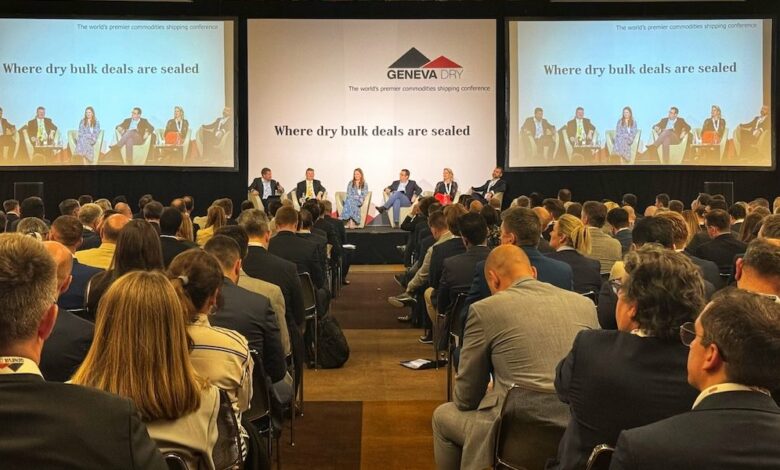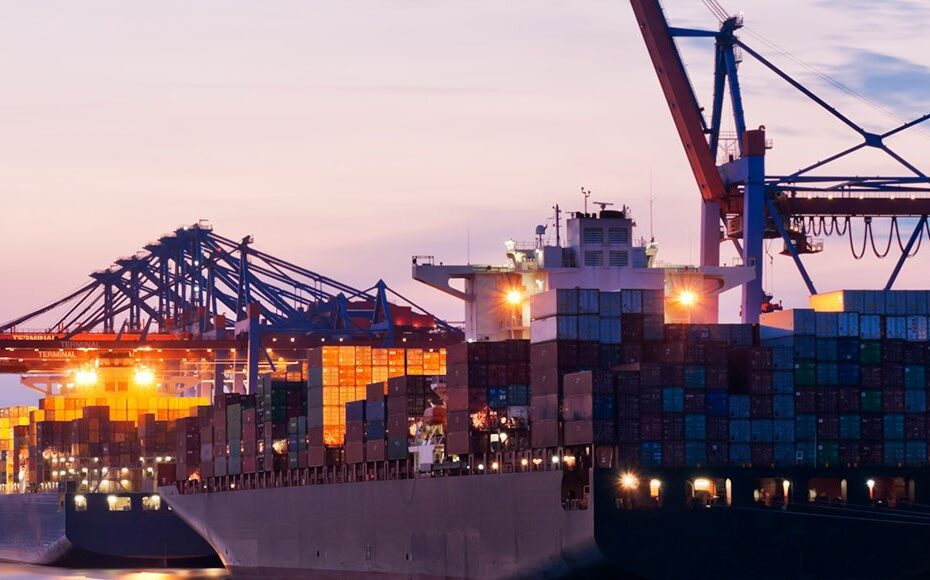
The first session at the first ever Geneva Dry conference tackled digital efficiency drivers across the dry bulk supply chain, smoothly moderated by Richard Watts from HR Maritime.
The panel was tasked with outlining how digitalisation can enhance dry bulk shipping operations to the benefit of both shipowners and charterers.
“It’s the wonders of our industry. Nothing changes until suddenly everything changes,” said Watts in his opening remarks.
Tabitha Logan, director of projects at Hong Kong shipowner Cetus Maritime and co-founder of pitch competition, The Captain’s Table, kicked proceedings off, discussing how her peers were swamped with vast amounts of data on a daily basis. A new open communication platform was launched at Cetus which was saving staff as much as two hours a day. At sea, Cetus is investing to create digitally connected ships, Logan said, trying to remove the “roadblocks” seafarers are forced to do, entering more and more data manually. The quest then is to ensure all the data Cetus is getting – including via recently installed sensors onboard – is of a high quality.
“I’m sure you’ll know, it’s rubbish in, rubbish out,” Logan told delegates.
Scott Bergeron, executive director at Germany’s largest dry bulk concern, Oldendorff Carriers, had slightly different terminology when discussing data quality.
“We call it shit in, shit out,” he said, going on to discuss how the rollout of Starlink sat comms was transforming the company’s business.
Oldendorff has a team of 20 involved in data collection, a headcount that is likely to double by the end of this year.
“I think the story of the last decade was identifying data, collecting data. But now we’re at a point where we really want the return on the investment of that data,” Bergeron said.
Cynthia Worley, vice president at SEDNA, a tech firm aiming to streamline emails, said that email is probably the tool shipping employees spend most of their time on in a day.
“Ours is a conservative industry because of the commercial consequences of missing out on something,” Worley said.
Ours is a conservative industry because of the commercial consequences of missing out on something
Back at Cetus, Logan discussed how her company had installed a transparent communication system over the past year, ditching Outlook in the process to create one big shared mailbox across the organisation. Pushback initially came from those who were protective of clients. However, as Logan recounted, that innate protectiveness dropped away because employees discovered much more triangularisation between the different strands of the business.
Discussion then turned to the age-old issue of shipping’s silo mentality with SEDNA’s Worley telling the audience: “It’s those silos that have kept us from collaborating for so long. But as soon as you start to see the value in sharing that data and insight, the benefits are there for all to see.”
Bergeron from Oldendorff warned that too many communication channels contribute to building further silos.
“To break down a silo, you really have to think who needs to know what I’m working on right now and how is this going to help,” he said.
All panellists were agreed that finally electronic bills of lading were taking hold in dry bulk, with many referring back to earlier incarnations such as Bolero from the 1990s.
Marco Camporeale, senior director of strategy at Inmarsat, pointed out that not everyone will be happy if shipping becomes more efficient thanks to digital developments.
“We need to remind ourselves that the shipping ecosystem is a very complex ecosystem and there are perverse incentives. So for every a ship operator who wants to arrive just in time, there is an ecosystem of providers who actually benefit from not arriving in time and spending time in port,” he observed.
Resistance, he said, comes from having different key stakeholders. And to overcome this – as incentives are not the solution – further regulation will be required, Camporeale insisted.
Questions rained in from the audience. Peter Schellenberger, founder of maritime consultancy Novamaxis, suggested the digital divide between big and small companies would only get larger.
“If you look at 70% of the world’s fleet having less than 15 vessels, are we moving towards the digital divide because obviously the small and medium sized owners do not have the means, not the IT capacity, nor the digital stakeholders inside that is needed to go for that transformation?” he said from the front row of the packed conference hall.
Agreeing, panellist Alberto Perez, global head of maritime commercial markets at Lloyd’s Register, said that not just digitalisation, but also ever more environmental regulation will drive consolidation in dry bulk, shipping’s largest and most fragmented sector.
“To thrive into in an era where you have so much flexibility on compliance or our target-based regulations, you need a certain scale and skills,” Perez said.
Finally, with 51 sponsors listening eagerly in the room, Bergeron, who oversees some 700 ships for Oldendorff, had some useful advice for any start-up brave enough to pitch him and his team for business.
Healthy scepticism, he said, was important, as was investing heavily in proper test results.
“Anyone who comes in with savings of fuel of 10% or any double-digit number, the alarms go off immediately. Nobody can save us 10%,” Bergeron said, going on to say: “So we’re accused a lot of being conservative in shipping and unwilling to to try new things. But the fact is, so many companies are under-capitalised. They have probably an interesting idea, but they’ve not yet invested enough money to prove that it can work.
“Put the money into your product. Test it. Make sure it’s robust. Make sure it’s achieved the real technology readiness level and then find a stakeholder in the organisation to help champion it and start small.”
Geneva Dry, the world’s premier commodities shipping conference returns on April 28 and 29 next year with delegate passes being limited to just 800. Tickets are now on sale here.
Tomorrow’s instalment from last week’s show will cover the economic and commodities outlook for the coming 24 months.





